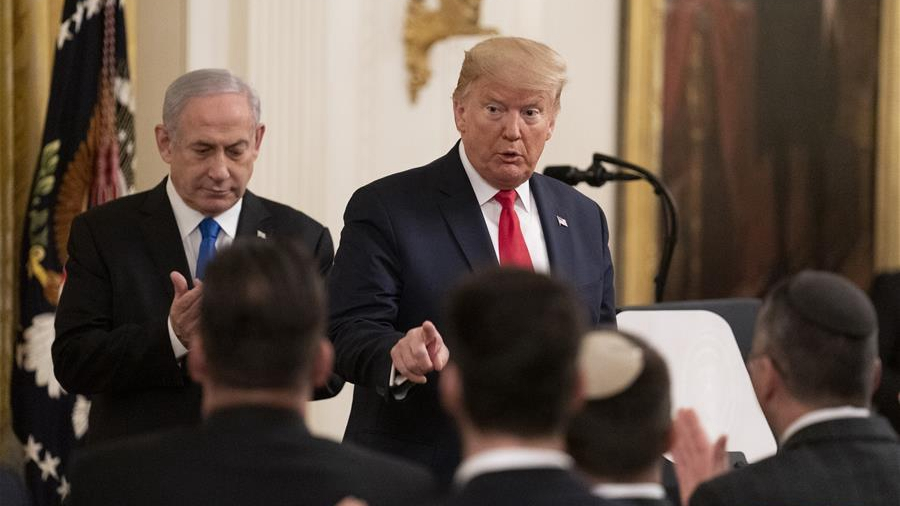
U.S. President Donald Trump (R) and Israeli Prime Minister Benjamin Netanyahu attend a joint press conference in the White House in Washington D.C., U.S., January 28, 2020. /Xinhua Photo
Editor's Note: Dr. Wang Jin is a research fellow of Charhar Institute in China and an associate Professor from Northwest University in China. The article reflects the author's opinion, and not necessarily the views of CGTN.
When Donald Trump announced his peace plan in the White House, it was more like a celebration of victory rather than the announcementof a meetingfacilitatingtalks between Palestinians and Israelis.
According to Donald Trump, the new 180-page plan is a "win-win opportunity for both sides, a realistic two-state solution that resolves the risk of Palestinian statehood to Israel's security." However, the new plan is a major lossfor Palestinians, and only anillusory"vision" for both sides.
The newly published 180-page "vision" is actually not new. In May 2019, Trump's son-in-law Jared Kushner advocated a "vision" with the name of "peace to prosperity", a name similar to the one Trump announced this time. Kushner had already conveyed the essence of Trump's plan for Israeli and Palestinian peace.
Both Trump's and Kushner's visions advocate the principle of "money for peace", which requires Palestinians to give up their claims to Jerusalem and the West Bank in exchange formore foreign investment and economic opportunities.
It may be true that the prospect of economic development, or "prosperity", was an important factor that encouraged the political representatives from Israel and Palestine to reach the Oslo agreement in early 1990s when they were trying to move forward the peace process.
Subsequently, in Trump's and Kushner's "visions", it is indicated that a future of economic prosperity can largely alleviate the hatred between Palestinians and Israelis and bring both sides together to create peace.
Well, money talks, but not always. Trump's new plan of attributingthe failure of Israeli-Palestinian peace to poor economic performance fails to recognize the reality.
For Palestine, Jerusalem and the West Bank should be Palestinian territories, whileTrump's decision of recognizing Jerusalem as the "capital of Israel" and transferring many key parts of the West Bank into the future territories of Israel cannot be accepted by Palestinians.
Even before Trump's announcement was made, Palestinian President Mahmoud Abbas had already refused to acknowledge the legitimacy of Trump's announcement. Other major political Palestinian factions, including Hamas and Palestine Islamic Jihad, boycotted the U.S.'s plan.

Israeli air strikes in Gaza, May 4, 2019. /Reuters Photo
Meanwhile, Trump's plan is less likely to bring asuccessful settlement of Israeli and Palestinian peace, at least not in the near future. The precondition for any success at peace should consist of aunified voice at the negotiation table and theimplementation of an agreement reached duringthe negotiation process by both sides regardless of their political divisions and frictions. However, this was not demonstrated by the Israeli side nor Palestinian side.
On the other hand, forIsrael, the divisions and competitions between different political parties have been increasinglywidening since the 1990s, and it is impossible to make major concessions by Israeli politicians towards Palestine over the status of Jerusalem and the Jewish settlements in the West Bank.
The alliance between different political parties in Israeli parliament, or Knesset, is so fragile that any sensitive issue could lead to acollapse of Israel's governmentwhichhas been suspended for more than a year. Israel'sinternal divisions have actually hindered a unified voice by thegovernment in its negotiation with Palestinians.
Meanwhile the divisions amongdifferent Palestinian factions are greater,highlighted bythe Palestine Authority led by Fatah in the West Bank, and the Gaza Strip controlled by Hamas. In addition, the Palestine Islamic Jihad is expanding its influence and trying to challenge Hamas' dominancein Gaza. Against this backdrop, it is impossible to unify all the voices of different factions in the negotiation table with Israel.
It is an arduoustask to facilitate the peace process between Israel and Palestine, given both sides' political status quoand distrust. It is nowhighly necessary for the Trump administration to maintain a neutral stanceand take the interests and concerns of both Israel and Palestine into consideration.
However, what Trump has donecould only promote the hatred between Israelis and Palestinians, and the realization of peace between Israel and Palestine still has a long way to go in the foreseeable future.
(If you want to contribute and have specific expertise, please contact us at [email protected].)
 简体中文
简体中文

